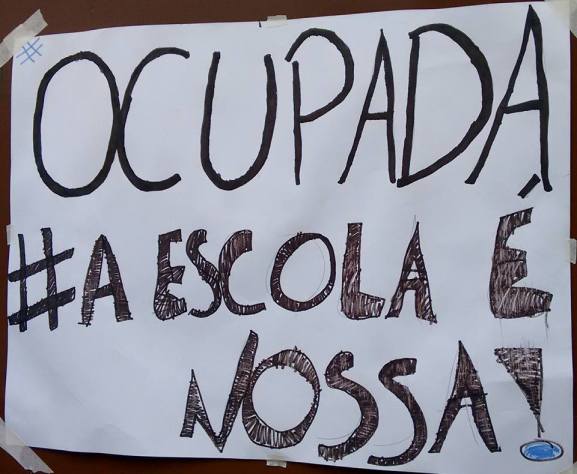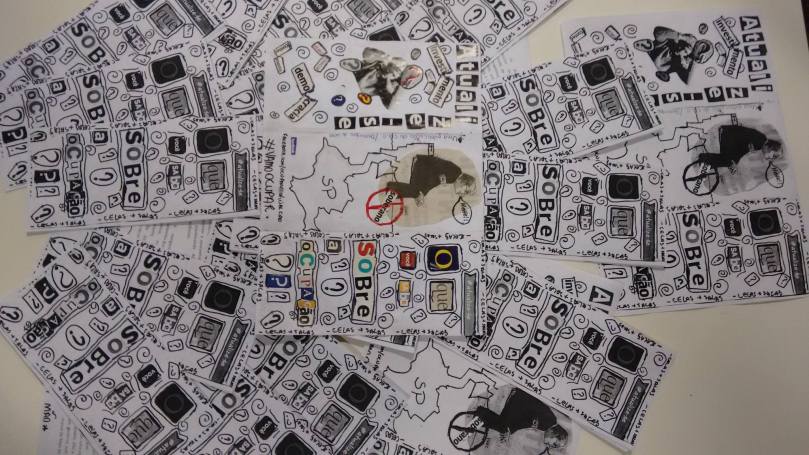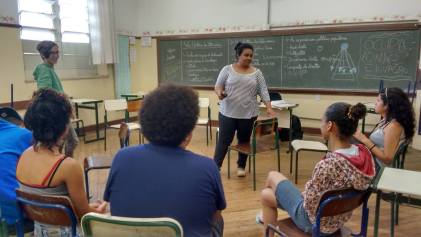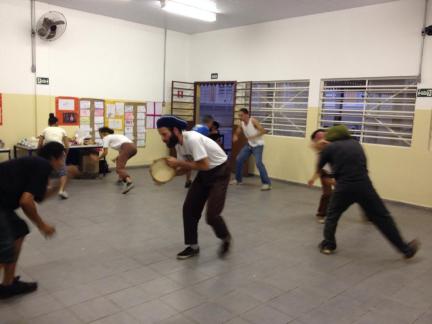Nearly two hundred schools have been occupied in the state of São Paolo since the end of October. The students have barricaded themselves into the schools as a form of protest against a planned reorganization presented by the governor of São Paolo Geraldo Alckmin.

The idea of the reorganization is to separate secondary schools from high schools (the students of both currently attend the same institution) and to cut the expenses connected with running the schools. In practice, this means that some schools would be merged and 92 schools would be closed; 311 thousand students would be relocated. Furthermore, there is a fear that the number of students per class would rise. “It is normal that there are 40 students in a class now. That’s already too many. But if the schools are merged, the number could go up to maybe 60 students for one class,” explained Beatriz (23), a university student who is supporting the protests by helping students to organize educational activities in two of the occupied schools in Assis.

Many students in Assis expressed the fears of increased numbers of students in a class. They are also concerned with the relocation which would mean that they would have to travel to more distant places and they would be separated from their friends or siblings. “Now I study in one school with my sister. But if the reorganization is carried, we won’t be attending the same school anymore. I don’t like that. I’m happy that we can be here together,” explained Tania (14) her reasons for taking part in the protests.
On the other hand, the reorganization has its supporters as well. “I think that it is a good idea to separate the secondary and high school students. They’ve got different needs and this can be better reflected if they aren’t together. However, I think the governor should have discussed this with the unions. It’s the way that it was announced rather than the reorganization itself that is bordering me,” said Helena (33) a university professor.
Mariana (24), a university student, expressed her disagreement with the occupation as such. “I think the police should intervene. The protests are organised by a left-wing political party and it’s just a political game.”
The political party PCO (Partido da Causa Operaia) has been one of the unifying elements in the protests, next to the students unions (UNI) and Brasilian organisation of secondary school students (UBES). All three try to promote communication between the occupied schools and provide material help. One of the schools in Assis refused the presence of the political party and they continue with the occupation, only with the help of individual volunteers from the public.
The volunteers are let in only during the day. They are mainly university students who come there to deliver various classes, carry workshops and engage the students in discussions on different topics. At night, the doors are locked and nobody is let in. Some of the university students camp outside the school to ensure that those inside are safe.





The students also need to cook for themselves, clean after themselves and generally make sure that everything in the school runs smoothly.
Thus, together with the informal classes, there is a great variety of activities that everybody can participate in. Unfortunately, despite the range, only few students take part in them. “There aren’t many of us here, because our classmates are scared. The headmistress threatened us that if we protest, she will make us repeat one school-year. I think some took her word, so they don’t come here. But I’m not scared. I know that we are right so it is important to continue. We discussed this with a lawyer who supports us and he explained that she has no legal means of doing this,” explained Leonardo (16), one of the students who occupies one of the schools in Assis.
Last Friday, the governor announced that the reorganization would not take place. Despite that, about 120 schools continue with the occupation. They are afraid that he will take the word back. Furthermore, the students now require a promise that none of the protesters will be punished for taking part and on the contrary, they demand that the police intervention, which happened in some schools and at the demonstrations in the city of São Paolo with the use of tear gas, is going to be investigated and punished.
While the politicians discuss what to do next, many students are left without the opportunity to go to normal school and have classes. However, those who decide to attend the informal discussions, workshops and to take active part in the protests, have unique chance to learn about the important role of a civil society and the strengths of informal education. Let´s hope that they will also have the chance to experience how it feels when the politicians listen to their voices and they enter into a constructive dialogue together.
***
All names were changed.


